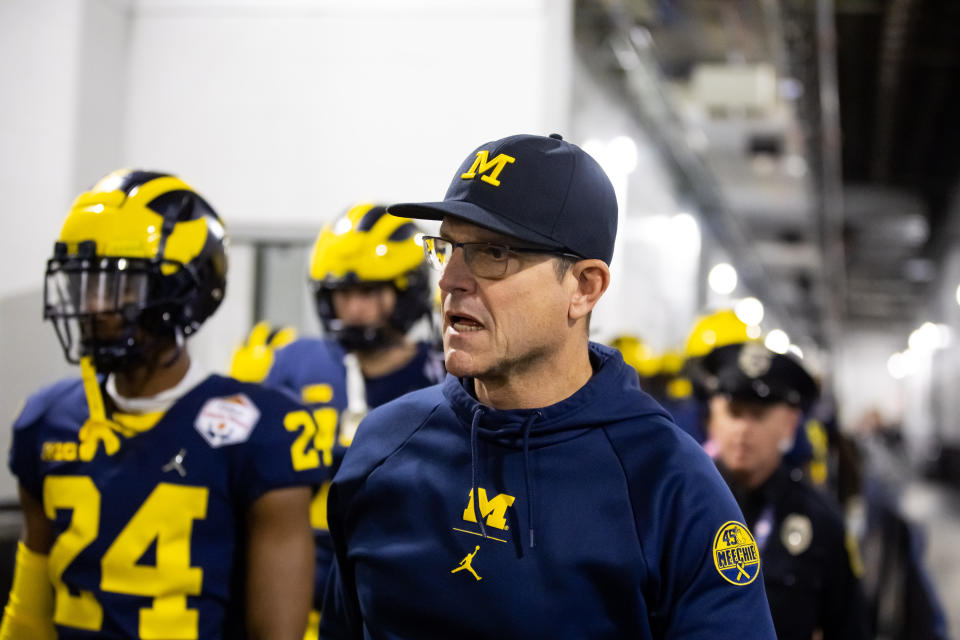A potential negotiated resolution in the NCAA infractions case involving the Michigan football program broke down this week after the NCAA demanded head coach Jim Harbaugh state that he lied to investigators, multiple sources told Yahoo Sports.
According to sources, Harbaugh has acknowledged his program committed four Level II violations, as the NCAA initially alleged. He has further apologized to the university that they occurred. However, he has refused to sign any document or publicly state that he was ever untruthful with the enforcement staff.
The 59-year-old has maintained he didn’t recall the events when first speaking with investigators but that he was never purposefully dishonest.
The NCAA delivered a draft of a notice of allegations earlier this month citing the four Level II violations. They include meeting with two recruits during a COVID-19 dead period, texting a recruit outside of an allowable time period, having analysts perform on-field coaching duties during practice and having coaches watching players work out via Zoom, according to sources.


The NCAA defines Level II violations as resulting in “less than a substantial or extensive recruiting, competitive or other advantage.” It further calls them “systemic violations that do not amount to lack of institutional control”.
Punishments are usually minor.
However, the NCAA claims that during the investigation, Harbaugh lied to enforcement staffers about those infractions, which is, itself, a Level I violation. That’s what turned this into a more serious case.
A Level I violation could carry with it a six-game suspension and significant recruiting restrictions, according to NCAA statutes. In the past, coaches have been hit with show cause penalties that make their employment difficult.
During two meetings this week, the NCAA and Harbaugh held firm and refused to back down from their positions. The NCAA said the coach lied. The coach said he merely forgot otherwise insignificant actions. An impasse resulted.
All of this has occurred during an eventful time for the football program. The Wolverines lost to TCU on New Year’s Eve in the semifinals of the College Football Playoffs. It capped a 13-1 season that saw Michigan reach the playoffs, win the Big Ten and defeat Ohio State in consecutive years.
Within days, Harbaugh’s name emerged again for various NFL head coaching openings, including the Denver Broncos, with whom he spoke. Then word broke of the NCAA infractions case and Harbaugh remained coy about returning to his alma mater for a ninth season.
Earlier this week, Harbaugh and the university stated he would be back for the 2023 season, but the looming NCAA case remained. Additionally, co-offensive coordinator Matt Weiss was suspended Tuesday as police investigate an allegation of someone at Schembechler Hall accessing university email accounts without authorization.
As for the NCAA case, at this point, the battle lines are drawn.
Harbaugh is not expected to back down and would likely mount a ferocious defense against any allegation he purposely lied. Harbaugh is famous for being stubborn, both as a player and as a head coach in the NCAA and NFL.
Additionally, it is generally challenging to prove someone knowingly lied without detailed contemporaneous evidence, which sources say the NCAA either lacks or simply doesn’t exist.
The NCAA could back off its attempt to gather that admission and resolve the case otherwise, however it has made no indication that it will do that. An NCAA punishment, even a short suspension, on the Level II violations without any admission of lying might be acceptable to Harbaugh. Anything involving admitting dishonesty would not, sources said.
Or the NCAA could proceed with a full case and issue a notice of allegation. A prolonged infractions case would take at least a year and potentially even longer, meaning Harbaugh could coach the entire 2023 season, where the Wolverines are again a national title contender.
Michigan would also have a decision to make on whether it should go to the wall in backing its coach in a fight with the NCAA. In the past, cooperation was often the path of least resistance for schools, but the NCAA has lost significant credibility and power over the past decade.
Public opinion has turned on amateurism in general — and thus the NCAA rules that stem from it — as well as the infractions process that has failed to punish high-profile cases with far more significant recruiting allegations. Initial public support has been heavily on Harbaugh’s side and whether that should or should not be a consideration for the enforcement staff, the reality is this isn’t 2003, or even 2018, any longer.
So does the NCAA still go all-in on trying to prove Jim Harbaugh lied? Does Michigan stand with its coach and tell the enforcement staff to pound sand and prove it?
Or can this still be resolved before an epic battle emerges between one of college athletics’ most powerful, popular and well-heeled institutions and one of football’s most famous coaches and a weakened governing body that even with diminished relevancy might still have might?
